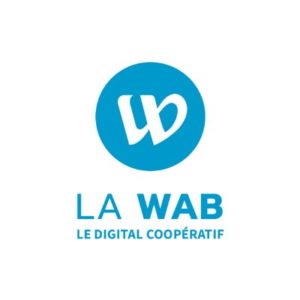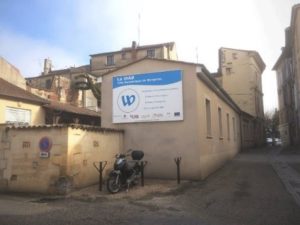 Based in Bergerac, France, la WAB is a free university specialised in short digital courses. The aim of this cooperative enterprise is to give access to the digital technology to everyone, and in particular to vulnerable people such as early leavers from the educational system or unemployed people, as well as rural businesses.
Based in Bergerac, France, la WAB is a free university specialised in short digital courses. The aim of this cooperative enterprise is to give access to the digital technology to everyone, and in particular to vulnerable people such as early leavers from the educational system or unemployed people, as well as rural businesses.
A. Why la WAB?
The founder of la WAB is a French man, Alban Brettes, who left his home town of Bergerac, France, to go study at the big city (here, Bordeaux) and then found a job abroad for a few years. If this sounds familiar, it’s probably because the depopulation trend is one of the most discussed threats to rural areas discussed currently amongst local actors and rural representatives.
 During his visits home, Alban first noticed how his classmates from high school couldn’t find any work in Bergerac and were moving to Bordeaux, and how the municipal policy was focusing on creating big peri-urban shopping centres to attract retail shops – but the city centre was growing empty consequently. The second observation he made was that local SMEs were struggling to become part of the digital world. Indeed, 25% of the SMEs in Bergerac employ 10 people or less with very poor digital literacy skills i.e. no training in web design, community management, graphism, etc. so they subcontracted those tasks.
During his visits home, Alban first noticed how his classmates from high school couldn’t find any work in Bergerac and were moving to Bordeaux, and how the municipal policy was focusing on creating big peri-urban shopping centres to attract retail shops – but the city centre was growing empty consequently. The second observation he made was that local SMEs were struggling to become part of the digital world. Indeed, 25% of the SMEs in Bergerac employ 10 people or less with very poor digital literacy skills i.e. no training in web design, community management, graphism, etc. so they subcontracted those tasks.
This is when he created la WAB in 2016, as a local solution to both offer some training options for free to unemployed or early leavers, as well as to create a taskforce in adequation with local needs.
B. What are the four pillars of la WAB’s business model?
La WAB is developed around four distinctive pillars:
- Two distinctive 7-months-long digital trainings (700 hours of class and 168 hours of apprenticeship in companies). These courses are completely free and do not require any prerequisites in terms of diplomas (not even the leaving cert) although they are recognised at national level once completed. The target audience is job seekers, young people without qualifications, women and residents of priority neighbourhoods. Selection of students is made with an entry test based on motivation.
- Short trainings for small enterprises (1-10 days) to get up to speed on web design, web marketing, e-mailing campaigns, Facebook page management, Google Analytics, etc. Enterprises pay for these trainings. Employees may use their vocational training rights to follow these trainings.
- Creation of an “employers’ alliance”. Integrating digital skills into a company can be too burdensome in terms of costs or administrative work. The employers’ alliance enables digital skills to be shared and thus to reduce costs while benefiting from the digital profiles required by a company.
- Co-working space and business accelerator equipped with high-speed Internet. Enterprises pay rent to work there but benefit from free administrative and entrepreneurial support.
A fifth pillar might be added in the future to train replicators who will transfer this business model to other rural areas facing the same issues.
C. What are the social benefits of la WAB?
La WAB is a social enterprise of public interest. Several social benefits can be identified.
– The cooperative enterprise
The Wab has the status of a cooperative society of collective interest. It is financed by public and private shareholders and public subsidies. Thus, both the local authorities (i.e. the townhall or the region) and local private companies (Crédit Agricole bank, local retirement home, etc.) are part of the cooperative. Each shareholder holds one vote, which allows local decision-makers to be involved in their desire to support the populations present on the territory in their transition to digital. In addition, thanks to public subsidies (10% of la WAB’s income) at all levels -from the county council to the EU- la WAB is above any commercial interest, and thus in theory escapes private interests to devote itself to its role of social development.
– The business model
In economic terms, the benefits earned with the rent of the co-working space and the trainings to enterprises finance the free courses for disadvantaged people, which are the only sources of income (90%) with the public subsidies (10%). The equilibrium between social impact and financial viability is very important to the founder.
Furthermore, concerning the employers’ alliance in particular, la WAB assumes the recruitment “risk” by employing the person and then subcontracting him/her to the employers’ alliance.
– The target audience
La WAB implemented its facilities in a “priority area” according to French zonage, meaning that local level of income and employment rate are lower than the national average. The aim for the founder is that 50% of the students should come from priority areas. This is also reflected in the absence of prerequisite in terms of diploma to enter the courses.
Conclusion
The first results of la WAB are very encouraging, already 200 students in 2 years out of which 50% continued on with their studies elsewhere and 50% got hired; 200 SMEs contacted them to get some support; 6.5 jobs were created thanks to the employers’ alliance and 10 full-time jobs in la WAB’s team. La WAB is only implanted in Bergerac right now but it certainly is an inspiring example which could be replicated in mountain areas!
For more information, see la WAB’s website: https://www.la-wab.fr/ (in French only)
25 May 2018









